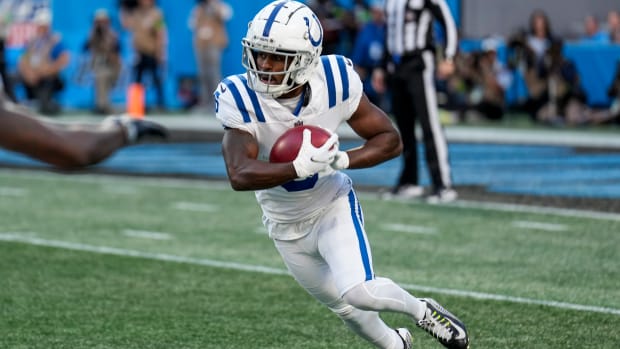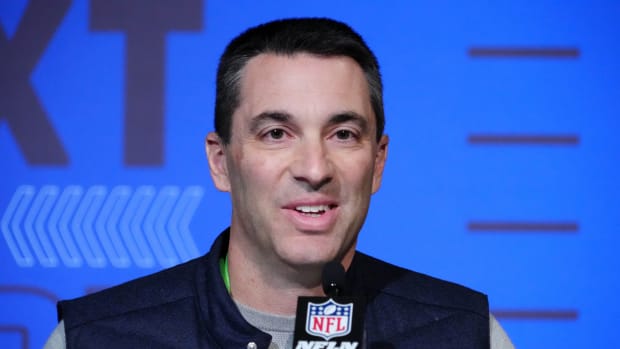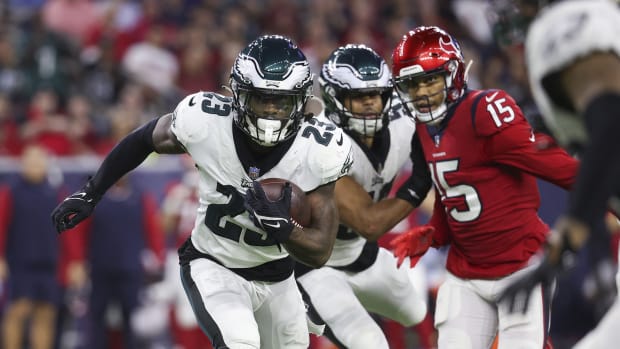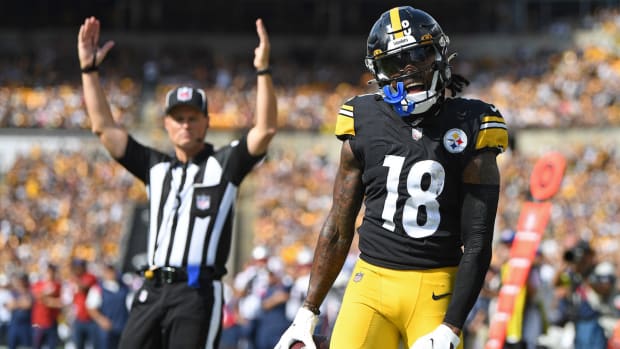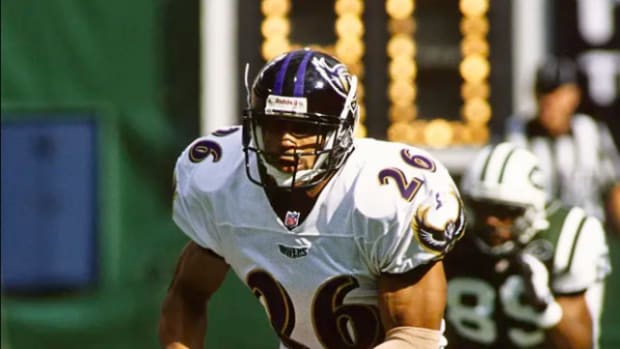Why Carson Wentz’s Contract Extension Is More Complex Than Most Realize
The night before the 2016 NFL draft, Eagles EVP of football operations Howie Roseman called agents Bruce and Ryan Tollner, with his boss, team owner Jeffrey Lurie, on the line. Philly had already traded up twice. It had conviction in what it’d do 24 hours later with the second pick in the draft. But there was still ground to cover.
During his gap year in 2015, Roseman dove into a study of team-building that led him to a conclusion—if he ever had a chance to run an NFL operation again, he’d prioritize building it around a quarterback. He was particularly taken by how the 2004 draft gave the Steelers, Giants and Chargers a decade of stability. Months later, he was on the precipice of making it happened. And if there was any doubt on how momentous a week it was for the organization, how big it is to take a quarterback that high, this phone conversation would erase that.
Lurie told the Tollners that all Eagles employees, football or otherwise, had offsets in their contracts and wanted assurances that Carson Wentz, the North Dakota State kid in Roseman’s sights, would be O.K. with that, now and down the line. Lurie also explained to the agents how important the team’s sponsors were to him, and how he didn’t want Wentz doing deals with their competitors. But most of all, Lurie told the Tollners that he wanted this to be a partnership. The owner knew, if it worked out, the then-23-year-old quarterback would be a tone-setter for his multibillion-dollar business for possibly the next decade and a half, and he and Roseman wanted to make sure the expectations were crystal clear.
This wasn’t just drafting a player. This was drafting a future.
That night, the path began to the four-year, $132 million extension—one that is far more complicated than most people realize—that Wentz and the Eagles agreed to last week, and finalized on Monday night in South Philly.
“It was absolutely three years worth of work,” Ryan Tollner said from California on Wednesday afternoon. “They’re a proactive team, they’ve planned for this all along. That Carson played at the level he has, the MVP level he was at before the injury, that wasn’t a surprise to them. That’s what they expected when they took him with the second pick. They had a plan to be at this point, and to extend him early.
“It’s been in the works since night before the draft. They wanted to know that Carson and his team would be right fit for the Eagles. He earned their trust. Carson is so consistent, such a culture-setter that when things got thrown for a loop, with the injury and another quarterback winning a Super Bowl, they didn’t blink.”
So it was that weekend where all hands that needed to be on deck were, and a deal to cement the place Roseman and Lurie always envisioned Wentz in was done.
In this week’s Game Plan, we’ll get to your questions on …
• Dak Prescott’s deal.
• The Raiders’ interesting mix.
• Urban Meyer in the NFL?
• Joe Douglas’s cabinet in Florham Park.
• Jalen Ramsey’s contract.
And we’re going to get to the rest on Wentz’s deal. But before that, we’re gonna go back to where we started this week, on Monday morning, right on the highway from Foxboro, Mass. to Houston.
Late Wednesday afternoon, the Patriots filed tampering charges against the Texans over the latter’s pursuit of New England VP of player personnel Nick Caserio. And, as we said on Monday, this is something you could see coming. Here are the facts…
• New Texans EVP of team development Jack Easterby, hired on April 2, is close with Caserio, and played a major role in the ouster of GM Brian Gaine. Caserio is also close with Texans coach Bill O’Brien.
• The night before, Easterby, who left the Patriots in February, attended the Patriots’ ring ceremony at owner Robert Kraft’s residence in Brookline, Mass.
• Shortly after firing Gaine on Friday afternoon, the Texans put in a request to interview Caserio for their newly vacant GM position.
• The Patriots dragged their feet on granting permission, and rumblings in league circles held that they were planning to try to block Caserio from interviewing, which they could only do if they proved that the Texans job wasn’t a “true” GM position, or that Caserio already had one in Foxboro.
• The Texans interviewed ex-Browns GM Ray Farmer on Saturday, and ex-Lions GM Martin Mayhew on Sunday. They haven’t interviewed another candidate since, which only added to the idea they’re zeroed in on Caserio, as they awaited permission to interview him.
So what will the Patriots’ case focus on? I’m told that the timing of the events above—Easterby and Caserio being together less than 24 hours before Gaine was fired, then the Texans putting in for Caserio almost immediately after moving on from Gaine—got their attention. Only adding to that was Caserio and Easterby seen talking with one another (which isn’t really unusual, but still …) at the Kraft’s house.
It’ll be interesting to see where things go next. Could the Patriots seek compensation for Caserio, who’s been as good a soldier as Belichick could ask for over the last 18 years? Would New England work to flat-out stop Caserio from going? Is that what Caserio, who’s turned down a ton of opportunities the last few years, really wants? Would it be awkward after all this for Caserio to go back to work in Foxboro?
The Patriots, of course, have been embroiled in tampering investigations in the past (they filed one against the Jets on Deion Branch, and the Patriots and Jets filed charges against one another on Darrelle Revis), and this one figures to be as interesting as the rest of them. If not moreso.
Alright, back to the Eagles.
If you don’t know about the 30-percent rule, you will soon. It’s a rule in the collective bargaining agreement designed to keep teams from stashing money into post-CBA years to create a competitive advantage in the here and now. Basically, it mandates that from the final year of the current CBA (2020) going forward, the sum of one year’s salary, roster bonus and option-bonus proration could not be exceeded the next year by more 30%.
When I’ve heard about this the last few months, I figured it to be contract mumbo-jumbo that would be easy to work around. But when I saw Wentz’s full deal, I couldn’t make it out; agents and team contract people who I called also had issues making sense of it too. As it turns out, Ryan Tollner fielded a number of calls from team folks on Wednesday who were seeking explanations on how the terms inside the contract work.
Earlier, I outlined the trust between Wentz’s camp and the team. That trust came into play while getting this deal done—and just as the Eagles have looked for Wentz to be a tone-setter, this one could be a tone-setter for other young quarterbacks, like Jared Goff and Dak Prescott, down the line. Because if that trust didn’t exist, there’s no way this contract would have been pushed across the goal-line earlier this week.
Roseman first reached out to Wentz’s camp in March, with the stated goal of taking the franchise into a sort of Wentz 2.0 phase for the franchise, with the quarterback off his rookie deal and the football operation adjusting in kind. He knew because of the complications associated, it’d take time and, as it did, a couple things would happen.
First, the Eagles would get a look at Wentz on the field in the spring to confirm where he was physically—and the team felt optimistic about that.
Second, Philadelphia would adjust the approach to the offseason. The team had been ultra-aggressive in 2017 and ’18 both in free agency, and in trading picks for veteran players, largely because they had their franchise quarterback cheap. That was going to change.
Having an expensive quarterback would mean they’d need to be more reliant on cheap talent acquired throgh the draft. Because of the many aggressive moves in the last few years, the Eagles had just five picks in this year’s draft, and five picks last year. That won’t happen again. By letting Nick Foles, Golden Tate and Jordan Hicks walk, without signing a significant UFA, they were gaming the comp-pick formula. In doing so, they may wind up with as many picks in 2020 as they had in ’18 and ’19 combined.
All the while, the team and Wentz’s camp were chipping away at a deal. The Eagles wanted a deal that Wentz would be comfortable with, and that would allow them to continue to team-build reasonably around him. Wentz’s camp wanted a deal that would give him security, and age well. And last week, both sides agreed to a term sheet with which everyone was satisfied. The terms included an average of $32 million over four new years, $55 million in the first calendar year, $56.47 million over the first two years, $81.8 million over the first three years and $103.9 million over the first four years.
There was still a lot of logistical work to do, because of that pesky 30 percent rule. And here’s how strong the trust is now—the Eagles and the Tollners agreed to announce the contract extension last Thursday, even before working that part out. The idea that it could fall apart in the weeds of the CBA hadn’t occurred to anyone.
So through Thursday, Friday, Saturday and Sunday, Ryan Tollner and Chase Callahan (on behalf of Wentz), and Jake Rosenberg, Aileen Dagrosa, and Bryce Johnston (on behalf of the Eagles) worked with the NFL’s Management Council and the NFLPA’s contract people (led by Mark Levin), to find a creative solution to, in effect, fit 10 pounds of you-know-what into a five-pound bag.
By early Sunday night, Ryan Tollner was calling Wentz and telling him that they’d cracked the code, and he’d fly with Callahan on Monday to finalize the deal. The Eagles called a 6 p.m. news conference, which set another sort of de facto deadline that no one was really worried would pass without the quarterback’s name scribbled on the paper. And, of course, they made it there.
Two days later, the contract became available to the public, and social media swirled with the aforementioned confusion. The deal, on paper, looked like it was missing a lot of the money from the four-year, $128 million accord (with $66 million fully guaranteed) that was reported on last week. But that’s just where the tricks in it were, to get around the rule. A snapshot of how that worked …
• When I first read the contract, I saw $137.8 million over six years, which is $17 million short of the total that the math added to a week ago. Looking closer, the salary, plus roster bonus, plus option bonus numbers in the final five years: $15.383 million, $18.9 million, $23.5 million, $28 million, $31 million. That adheres to the 30-percent rule.
• That missing $17 million? All Wentz has to do is hit one of a ton of markers for individual or team offensive improvement this year or next, or make the Pro Bowl, and every penny of it is unlocked. The likelihood of him missing that incentive (which adds $11.5 million in 2021, $3.5 million in ’22, $2 million in ’23) is basically zero. But just in case he does, he’d get another crack at it in ’21. All of that, by the way, is irrelevant to the 30 percent rule, other than to circumvent it.
• As a practical matter, because of a rolling guarantee structure that locks the Eagles into some Year 4 money in Year 3, Wentz will almost certainly make the $103.9 million he’s due through four years, with the last two years of the deal serving as, in essence, team options.
• The real incentives in the deal are in the extra $16 million he can make, which would push him to $36 million per, eclipsing Russell Wilson’s APY of $35 million per. If he’s named MVP or Offensive Player of the Year in any of the next five years, another $5 million is unlocked. If he makes three Pro Bowls, or two with one coming in a playoff year, $6 million in unlocked. And if the Eagles win the Super Bowl in a season where Wentz plays 70 percent of the snaps or more, the final $5 million is spread over the remaining years of his deal. It is, by the way, no coincidence, that the three QBs ahead of him (Wilson, Aaron Rodgers, Ben Roethlisberger) as money-makers have each achieved at least two of those things.
Wentz and the Eagles can now move forward with this deal taken care of, and if the plan that Lurie and Roseman laid out to the Tollners three years ago comes to life, this will just be the start.
“That’s what they see, and what they saw all along—they’d lock him up long-term, and be in position to be competing for a championship every single year,” Ryan Tollner said. “The blueprint is obviously New England, with their incredible run of dominance in their division, and through the league. And I know Philly’s hoping to be at that level, and hoping this is a big step in that direction.”
The truth, of course, is everything hasn’t gone exactly according to plan. Foles wasn’t supposed to be the one winning the Super Bowl 17 months ago, nor did anyone envision Wentz would finish his second and third years on the shelf. Which could well mean the best is yet to come—or that’s at least the hope.
Now let’s get to the mail …
MAILBAG
From Louie (@Louie_Rock): There are a lot of names being rumored regarding who Joe Douglas’s VP of Player Personnel will be with the Jets. Who has the inside track on the gig? And what are some names to look out for regarding his front office overall?
So Louie, my guess would be if Phil Savage comes aboard, it’d likely be in some sort of senior personnel executive role, and outside the typical flow chart for a personnel department. We’ve seen that with ex-GMs in the past. And ESPN’s Todd McShay would, for obvious reasons, lean towards the college side. Another potential add would be Bears exec Champ Kelly, who interviewed for the Jets GM job.
Really, the two names I’m watching closest here are Eagles director of player personnel Andy Weidl and college scouting director Ian Cunningham. Both worked with Douglas in Baltimore, and were hired in Philly by Douglas. Both are well-respected and qualified to take a step up. Both are also under contract, for now. So will Roseman let one or both go, knowing he might lose them next year anyway? Or maybe he promotes them (Weidl’s taken on more responsibility already)?
Stay tuned.
From Cole (@Famcole1): Which NFL team is the best fit for Urban [Meyer]?
So I don’t know that Meyer is going to coach anywhere again, but I wouldn’t wholly rule out the NFL, like others have. I don’t think he’ll take a job in the SEC or Big 10, because of his ties to Florida and Ohio State, nor do I believe that he’ll take a college position at anything less than a blueblood. That might make it USC-or-bust on that level, at least in the short term.
Along those lines, I don’t think he’d take an NFL job just to take one; it would have to be either a legacy franchise or one to which he has a personal connection. Some have connected him to New England because of his relationship with Bill Belichick and the Kraft family.
The other one I’d just pay slight attention to is in Dallas, if things come undone this year. My guess is that the Joneses would go big-game hunting, and I think it’d start with Oklahoma’s Lincoln Riley. But I sure wouldn’t rule a run at Meyer out there either.
From Frank (@FCSVII): Should we expect Jalen Ramsey to be the first $19 million cornerback when his time comes?
In a word, yes. The market for defensive players changed when Rams DT Aaron Donald signed his contract for $22.5 million per, and Bears pass rusher Khalil Mack got his at $23.5 million. That’s been affirmed with both Cowboys DE DeMarcus Lawrence and Chiefs DE Frank Clark coming in at around $21 million per. All of that means that we’ll soon the first $20 million corner, since corners, like edge rushers, come at a premium.
From the 2015 draft, Rams’ Marcus Peters would come closest to changing the cornerback market, which is right at $15 million now. Looking at the 2017 class, players who are eligible for deals next year, someone like Cincinnati’s William Jackson emerges as a candidate alongside Ramsey. But right now, I’d say Ramsey and Saints’ Marshon Lattimore have the best shot to hit that $20 million contract mark as cornerbacks.
Down the line guys like Cleveland’s Denzel Ward and Green Bay’s Jaire Alexander are names worth watching.
From Paul Owers (@paulowers): Do you think Josh Rosen and Ryan Fitzpatrick will be just good enough to mess up Miami’s plan to tank in 2019?
Paul, there’s a decent chance of that, although I don’t think the teardown in Miami is about winning just one or two games in 2019—to me, it’s more about clearing the decks. Forgetting Fitzpatrick for a second, if Rosen plays well enough to have the Dolphins winning, or plays really well, period, then more interesting questions about the team’s future at the position will be raised.
There are too many moving parts to make it black-and-white in any way right now. Are the Dolphins picking third, thirteenth or 23rd in the 2020 draft? What if Rosen is simply promising, and not spectacular? How does Justin Herbert play at Oregon? Tua Tagovialoa at Alabama? Does another college quarterback emerge this season, a la Dwayne Haskins last fall?
It’s really going to be interesting there going forward. The good news is, in short order, GM Chris Grier has given the team flexibility and options in the post-Ryan Tannehill Era. And given himself, potentially, more than one swing at getting it right.
From Bryson (@brysonznasty): At what price point would you not want to sign Dak [Prescott]?
Bryson, this is a tough one. I’d be comfortable paying Dak Prescott in the $30 million per range, and hope to trade some upside off to Prescott, for flexibility later in the deal. Taking care of him there wouldn’t cripple the team in any way, and the upside/flexibility tradeoff would give each side some protection a few years down the line again given the possibility that things swing wildly in one direction or the other.
My feeling is if you get to or past what Wentz made in his recent extension, then it’s probably time to plan on using the franchise tag (which should come in around $27 million) for 2020. Iit would take away the option to use it on someone else, like Amari Cooper, which would then swing leverage into someone like Cooper’s favor. And the quarterback market could shift between now and then, too.
What I don’t see is a scenario where Prescott isn’t the Cowboys quarterback in 2020.
From Mason LeDonne (@masonFLD): Which divisions do you see having different winners this year?
Generally, more than half the division champs turn over year-to-year in the NFL. I see the Patriots, Rams, Saints and Chiefs as most likely to defend their divisional titles next year, based on the competition around them in 2019.
That leaves the AFC North (Ravens are the defending champions), AFC South (Texans), NFC East (Cowboys) and NFC North (Bears). In the AFC North, I think the Browns and Steelers will be solid, and the Bengals could surprise. I’d say the Colts are the favorites in the AFC South, over the Texans. The Eagles are about even with the Cowboys in the NFC East. And the NFC North is wide open.
We’ve got a fun year coming.
From Return To Greatness (@JustWinBabyX3): What are your expectations for the Raiders this year and how well do you think the Gruden, Carr, Brown trio will do this upcoming season?
Derek Carr played really well down the stretch, and no one seemed to pay attention. And now he gets Antonio Brown and Tyrell Williams and Josh Jacobs, and Trent Brown up front. And isn’t starting from zero under Jon Gruden like he was last year. Which is to say I think the Raiders offense could be pretty good, even with Jared Cook and Marshawn Lynch gone.
The flip side is the team is very young on defense, and has youth in a key spots along the defensive line and in the secondary. I think how those guys play – guys like Arden Key, Maurice Hurst, Clelin Ferrell and Maxx Crosby up front, and Gareon Conley, Trayvon Mullen and Johnathan Abram on the back end – will the swing factor for the 2019 Raiders.
The cool part is we’ll get to see it all unfold on HBO’s Hard Knocks in a few months.

































